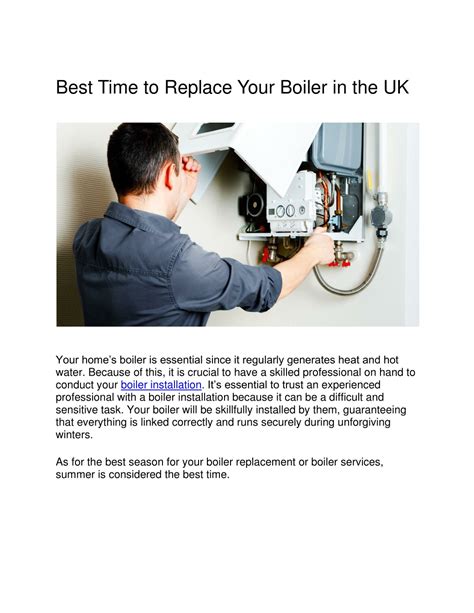The Best Time to Replace Your Boiler: Cost & Timing
Replacing your boiler is a significant investment, but a necessary one when your current system is failing or inefficient. Knowing when to replace your boiler and understanding the associated costs can save you money and headaches in the long run. This comprehensive guide will help you determine the optimal time for a boiler replacement, explore the cost factors, and navigate the process smoothly.
How Old is Your Boiler?
One of the most crucial factors determining when to replace your boiler is its age. Most boilers have a lifespan of 10-15 years. Beyond this point, they become increasingly inefficient, prone to breakdowns, and more expensive to repair. While a well-maintained boiler might last longer, the cost of repairs often surpasses the cost of a replacement. If your boiler is nearing or exceeding its lifespan, it's time to start considering a replacement.
Signs Your Boiler Needs Replacing
Beyond age, several signs indicate your boiler is nearing the end of its life:
- Frequent breakdowns: Constant repairs are a clear sign of wear and tear. The cumulative cost of repairs will likely outweigh the expense of a new boiler.
- High energy bills: An inefficient boiler consumes significantly more energy, leading to inflated energy bills. If your heating costs are inexplicably high, your boiler might be the culprit.
- Strange noises: Unusual noises like banging, gurgling, or whistling indicate potential internal problems that could lead to a complete system failure.
- Lack of hot water: Inconsistent or insufficient hot water supply suggests a malfunctioning boiler.
- Leaking or corrosion: Visible signs of leaking or rusting are a critical warning sign, indicating potential safety hazards and the need for immediate replacement.
- Pilot light issues: A constantly flickering or extinguishing pilot light is a sign of a problem with the gas supply or the boiler's ignition system.
What is the average cost of a new boiler?
The cost of a new boiler varies significantly depending on several factors:
- Boiler type: Condensing boilers are more energy-efficient and generally more expensive than conventional boilers. Different fuel types (gas, oil) also impact cost.
- Boiler size: Larger homes require more powerful boilers, increasing the cost.
- Installation complexity: The complexity of the installation, including pipework modifications or system upgrades, impacts labor costs.
- Location: Installation costs vary geographically due to labor rates and regional differences.
Generally, you can expect to pay anywhere from £1,500 to £5,000 or more for a new boiler and installation. It's advisable to obtain several quotes from reputable installers to compare prices and services.
Is it cheaper to repair or replace a boiler?
This is a crucial question. While a single repair might seem cheaper upfront, frequent breakdowns will quickly accumulate costs. If your boiler is old and requires multiple repairs, a replacement is often the more cost-effective long-term solution. Consider the overall lifespan and efficiency gains of a new boiler against the escalating repair costs of an aging unit.
What is the best time of year to replace a boiler?
The best time to replace your boiler is typically during the spring or summer months. This avoids the peak demand during the colder months when installers are busiest and prices may be higher. Replacing your boiler in the off-season also allows you to avoid any heating disruptions during the coldest part of the year.
Can I get financial help to replace my boiler?
Several government schemes and energy efficiency programs offer financial assistance for boiler replacements, particularly for low-income households. Research available grants and schemes in your area to see if you're eligible for financial help.
How do I find a reputable boiler installer?
Finding a trustworthy installer is crucial for a successful boiler replacement. Look for installers with relevant certifications, positive reviews, and memberships in professional bodies. Always obtain multiple quotes and compare services before making a decision.
Replacing your boiler is a significant undertaking, but by carefully considering the factors outlined in this guide, you can make an informed decision that balances cost and long-term benefits. Remember to prioritize energy efficiency and choose a reputable installer to ensure a smooth and successful replacement process.

